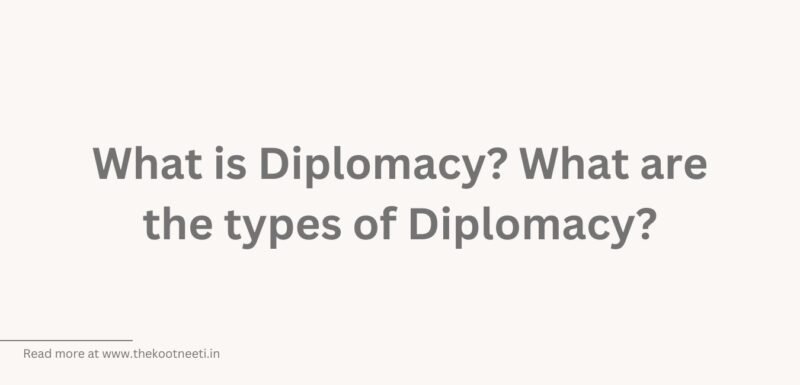What is Diplomacy? What are the types of Diplomacy?

Diplomacy is the practice of conducting negotiations and other interactions between states and other actors in the international system in order to manage conflicts and address issues of mutual concern. Diplomacy involves the use of communication, negotiation, and other peaceful means to address disputes and build relationships between countries and other actors.
Diplomacy can take many forms, such as direct negotiations between leaders, exchanges of envoys or representatives, and the use of international organizations and other intermediaries. It is an important tool for managing conflicts and building cooperation between countries and other actors, and it is often seen as an alternative to more aggressive or confrontational approaches, such as war or economic sanctions.
Diplomacy is an ancient practice that has played a central role in international relations for centuries. It is a crucial tool for managing relations between countries and other actors and for addressing global challenges such as climate change, terrorism, and economic inequality. Diplomacy is often conducted through a network of embassies, consulates, and other diplomatic missions that represent countries around the world.
What are the types of Diplomacy?
There are many different types of diplomacy, and they can be classified in various ways. Here are some examples of the types of diplomacy:
- Formal diplomacy: Formal diplomacy refers to the official and formal channels of communication and negotiation between states and other actors in the international system. It typically involves the use of embassies, consulates, and other diplomatic missions, and it is often conducted by professional diplomats.
- Informal diplomacy: Informal diplomacy refers to the use of unofficial or informal channels of communication and negotiation between states and other actors. It may involve the use of intermediaries or informal networks to facilitate communication and negotiation, and it may be conducted by non-diplomatic actors, such as businesspeople or civil society representatives.
- Public diplomacy: Public diplomacy refers to the use of communication and other public-facing activities to influence the views and opinions of the foreign public and to build relationships between countries and other actors. It may involve activities such as cultural exchanges, educational programs, and media outreach.
- Track two diplomacy: Track two diplomacy refers to the use of informal and unofficial channels of communication and negotiation between states and other actors, often involving non-governmental actors such as academics, civil society representatives, or businesspeople. It is often used to build trust and address issues that may be difficult to address through formal channels.
- Digital diplomacy: Digital diplomacy refers to the use of digital technologies, such as social media and other online platforms, to facilitate communication and engagement between states and other actors. It is a relatively new form of diplomacy that has emerged in recent years with the growth of the internet and social media.
These are just a few examples of the types of diplomacy, and there are many others as well. Diplomacy is a complex and multifaceted practice that involves the use of a range of tools and approaches to address conflicts and build relationships between countries and other actors.
History of Diplomacy
Diplomacy is an ancient practice that has played a central role in international relations for centuries. The use of diplomacy as a means of managing conflicts and building relationships between states and other actors dates back to ancient civilizations, such as the Greeks and the Romans.
Over time, diplomacy has evolved and taken on many different forms. During the Middle Ages, diplomacy was often conducted through the exchange of envoys and other representatives, and it played a crucial role in the management of conflicts between states and other actors. The development of modern nation-states and the emergence of international law in the 16th and 17th centuries also had a significant impact on the practice of diplomacy.
In the modern era, diplomacy has become increasingly complex and multifaceted. It involves the use of a range of channels and tools to facilitate communication and negotiation between states and other actors, including embassies, consulates, international organizations, and digital platforms. Diplomacy has also become an increasingly important tool for addressing global challenges such as climate change, terrorism, and economic inequality.


















